新概念英语2讲义
- 格式:doc
- 大小:49.50 KB
- 文档页数:10
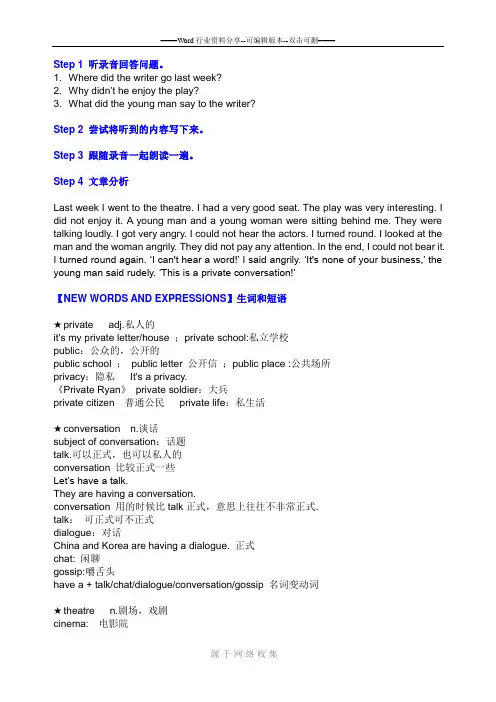
Step 1 听录音回答问题。
1. Where did the writer go last week?2. Why didn’t he enjoy the play?3. What did the young man say to the writer?Step 2 尝试将听到的内容写下来。
Step 3 跟随录音一起朗读一遍。
Step 4 文章分析Last week I went to the theatre. I had a very good seat. The play was very interesting. I did not enjoy it. A young man and a young woman were sitting behind me. They were talking loudly. I got very angry. I could not hear the actors. I turned round. I looked at the man and the woman angrily. They did not pay any attention. In the end, I could not bear it.I turned round again. ‘I can't hear a word!’ I said angrily. ‘It's none of your business,’ the young man said rudely. ‘This is a private conversation!’【NEW WORDS AND EXPRESSIONS】生词和短语★private adj.私人的it's my private letter/house ;private school:私立学校public:公众的,公开的public school ;public letter 公开信;public place :公共场所privacy:隐私It's a privacy.《Private Ryan》private soldier:大兵private citizen 普通公民private life:私生活★conversation n.谈话subject of conversation:话题talk.可以正式,也可以私人的conversation 比较正式一些Let’s have a talk.They are having a conversation.conversation 用的时候比talk正式,意思上往往不非常正式.talk:可正式可不正式dialogue:对话China and Korea are having a dialogue. 正式chat: 闲聊gossip:嚼舌头have a + talk/chat/dialogue/conversation/gossip 名词变动词★theatre n.剧场,戏剧cinema: 电影院★seat n.座位have a good seat(place)take a seat : 座下来,就座take your seat/take a seatIs the seat taken? 这个座位有人吗?no/yessit Sit down ,pleaseseat Take your seat, please.Be seated, please 更为礼貌seat是及物动词,后面有宾语sit是不及物动词,后面不加宾语seat后面会加人; seat sb; seat him; seat:让某人就座sit he is sitting there.you seat him;〖语法精粹〗When all those present__, he began his lecture.A. sitB. seatC. seatedD. were seatedsit, sit down; seat, be seated; take a seat★play n.戏★loudly adv. 大声的★angry adj. 生气的cross=angry ; I was angry. He was cross.Don't get cross with me, it wasn't my fault.不要对我生气,那不是我的错。
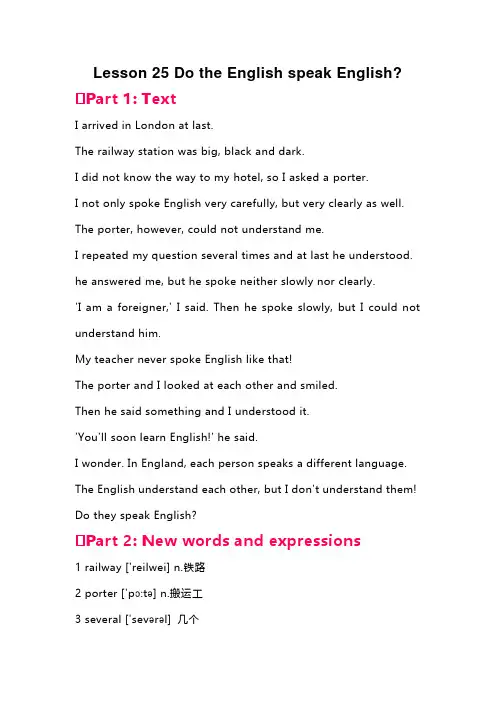
Lesson 25 Do the English speak English?Part 1: TextI arrived in London at last.The railway station was big, black and dark.I did not know the way to my hotel, so I asked a porter.I not only spoke English very carefully, but very clearly as well. The porter, however, could not understand me.I repeated my question several times and at last he understood. he answered me, but he spoke neither slowly nor clearly.'I am a foreigner,' I said. Then he spoke slowly, but I could not understand him.My teacher never spoke English like that!The porter and I looked at each other and smiled.Then he said something and I understood it.'You'll soon learn English!' he said.I wonder. In England, each person speaks a different language. The English understand each other, but I don't understand them! Do they speak English?Part 2: New words and expressions1 railway ['reilwei] n.铁路2 porter ['pɔ:tə] n.搬运工3 several ['sevərəl] 几个4 foreigner['fɔrinə] n.外国人5 wonder ['wʌndə] v.感到奇怪★ railway n. rail(铁路)+way(路,途径)rail 扶手,栏杆,围栏jump the rail 出轨stair rails 楼梯的扶手ride the rails 逃火车票railway/railroad station:火车站火车站很大,又黑又暗。
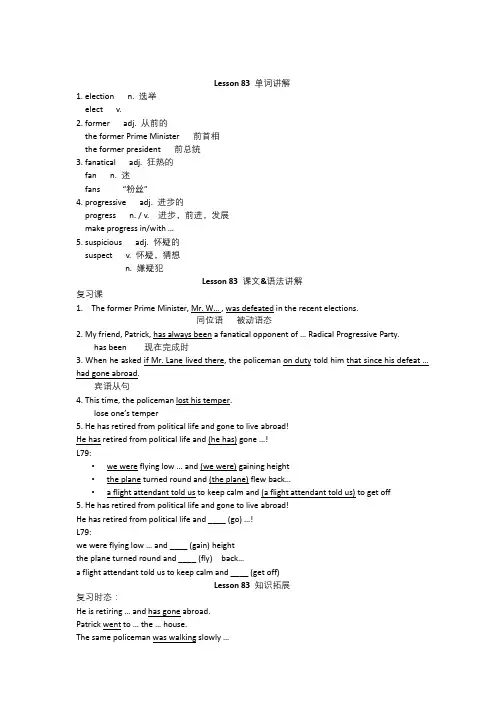
Lesson 83 单词讲解1. election n. 选举elect v.2. former adj. 从前的the former Prime Minister 前首相the former president 前总统3. fanatical adj. 狂热的fan n. 迷fans “粉丝”4. progressive adj. 进步的progress n. / v. 进步,前进,发展make progress in/with …5. suspicious adj. 怀疑的suspect v. 怀疑,猜想n. 嫌疑犯Lesson 83 课文&语法讲解复习课1. The former Prime Minister, Mr. W…, was defeated in the recent elections.同位语被动语态2. My friend, Patrick, has always been a fanatical opponent of … Radical Progressive Party.has been 现在完成时3. When he asked if Mr. Lane lived there, the policeman on duty told him that since his defeat …had gone abroad.宾语从句4. This time, the policeman lost his temper.lose one’s temper5. He has retired from political life and gone to live abroad!He has retired from political life and (he has) gone …!L79:•we were flying low … and (we were) gaining height•the plane turned round and (the plane) flew back…• a flight attendant told us to keep calm and (a flight attendant told us) to get off5. He has retired from political life and gone to live abroad!He has retired from political life and ____ (go) …!L79:we were flying low … and ____ (gain) heightthe plane turned round and ____ (fly) back…a flight attendant told us to keep calm and ____ (get off)Lesson 83 知识拓展复习时态:He is retiring … and has gone abroad.Patrick went to … the … house.The same policeman was walking slowly …I love to hear you say it.时态时vs. 态通过谓语动词的变化来体现共16 种过去现在将来过去将来一般√√√√进行√√完成√√完成进行。
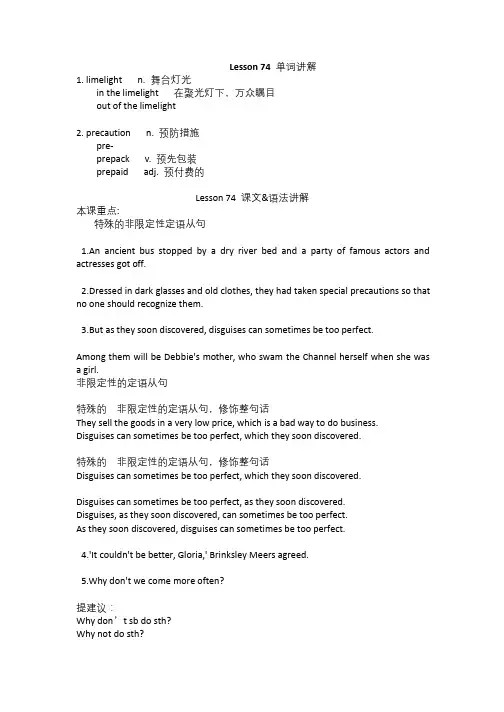
Lesson74单词讲解1.limelight n.舞台灯光in the limelight在聚光灯下,万众瞩目out of the limelight2.precaution n.预防措施pre-prepack v.预先包装prepaid adj.预付费的Lesson74课文&语法讲解本课重点:特殊的非限定性定语从句1.An ancient bus stopped by a dry river bed and a party of famous actors and actresses got off.2.Dressed in dark glasses and old clothes,they had taken special precautions so that no one should recognize them.3.But as they soon discovered,disguises can sometimes be too perfect.Among them will be Debbie's mother,who swam the Channel herself when she was a girl.非限定性的定语从句特殊的非限定性的定语从句,修饰整句话They sell the goods in a very low price,which is a bad way to do business. Disguises can sometimes be too perfect,which they soon discovered.特殊的非限定性的定语从句,修饰整句话Disguises can sometimes be too perfect,which they soon discovered.Disguises can sometimes be too perfect,as they soon discovered.Disguises,as they soon discovered,can sometimes be too perfect.As they soon discovered,disguises can sometimes be too perfect.4.'It couldn't be better,Gloria,'Brinksley Meers agreed.5.Why don't we come more often?提建议:Why don’t sb do sth?Why not do sth?What/How about doing sth?If I were you,I would do sth.6.When they had all made themselves comfortable,a stranger appeared.本课重点:特殊的非限定性定语从句Lesson74知识拓展本课重点:as引导特殊的非限定性定语从句But as they soon discovered,disguises can sometimes be too perfect.as引导状语从句1时间状语从句“当……时候”As the thieves were trying to get away in their car,Roy drove his bus into the back of it.as引导状语从句2原因状语从句“因为”As a great many people will be visiting the country,the government will be building new hotels…as引导状语从句3比较状语从句“跟……相比”Though in those days,travelling was not as easy as it is today,steam boats carried thousands of visitors across the Channel from Europe.as引导状语从句4方式状语从句“按照……方式”Jeremy was a little disappointed…but he did as his daughter asked.本课重点:as引导特殊的非限定性定语从句引导4种不同的状语从句。
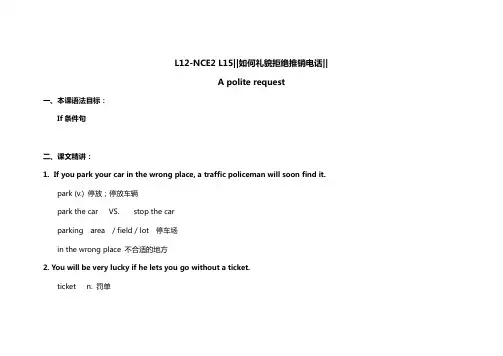
L12-NCE2 L15||如何礼貌拒绝推销电话||A polite request一、本课语法目标:If条件句二、课文精讲:1.If you park your car in the wrong place, a traffic policeman will soon find it.park (v.) 停放;停放车辆park the car VS. stop the carparking area / field / lot 停车场in the wrong place 不合适的地方2. You will be very lucky if he lets you go without a ticket.ticket n. 罚单let (sb) go 放开,使自由Let it go! 任它去,放下3.However, this does not always happen. Traffic police are sometimes very polite.(1)however,然而,表转折,用逗号与其它成分隔开I'd like to go with you; however, my hands are full.(2)polite (adj.) 有礼貌的,客气的impolite / rude (adj.) 无礼的,粗鲁的Manners maketh man. 不知礼,无以立也。
4.During a holiday in Sweden, I found this note on my car: …note (n.) 字条,便条a note of thanksIt's a custom to write a note of thanks to the hostess.take notes 做笔记5.'Sir, we welcome you to our city. This is a 'No Parking' area.(1)welcome (sb.) to + place 欢迎某人来到某地北京欢迎你! →Welcome to Beijing!(2)no+ doing,表示禁止做…No Smoking.No Swimming.6.'… You will enjoy your stay here if you pay attention to our street signs.'(1)pay attention to 注意;重视In doing our work, we must pay attention to ways and means.做工作应注意方式方法。
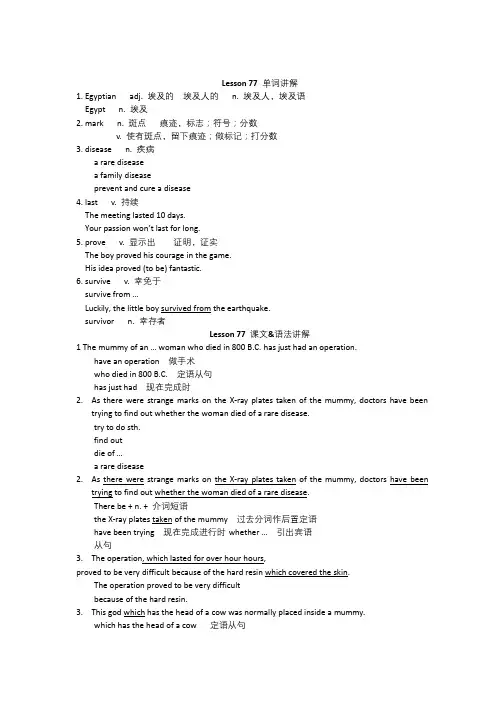
Lesson 77 单词讲解1. Egyptian adj. 埃及的埃及人的n. 埃及人,埃及语Egypt n. 埃及2. mark n. 斑点痕迹,标志;符号;分数v. 使有斑点,留下痕迹;做标记;打分数3. disease n. 疾病a rare diseasea family diseaseprevent and cure a disease4. last v. 持续The meeting lasted 10 days.Your passion won’t last for long.5. prove v. 显示出证明,证实The boy proved his courage in the game.His idea proved (to be) fantastic.6. survive v. 幸免于survive from …Luckily, the little boy survived from the earthquake.survivor n. 幸存者Lesson 77 课文&语法讲解1 The mummy of an … woman who died in 800 B.C. has just had an operation.have an operation 做手术who died in 800 B.C. 定语从句has just had 现在完成时2. As there were strange marks on the X-ray plates taken of the mummy, doctors have beentrying to find out whether the woman died of a rare disease.try to do sth.find outdie of …a rare disease2. As there were strange marks on the X-ray plates taken of the mummy, doctors have beentrying to find out whether the woman died of a rare disease.There be + n. + 介词短语the X-ray plates taken of the mummy 过去分词作后置定语have been trying 现在完成进行时whether …引出宾语从句3. The operation, which lasted for over hour hours,proved to be very difficult because of the hard resin which covered the skin.The operation proved to be very difficultbecause of the hard resin.3. This god which has the head of a cow was normally placed inside a mummy.which has the head of a cow 定语从句4. They feared that the mummy would fall to pieces when they cut it open, but fortunately thishas not happen.Lesson 77 知识拓展复习:现在完成时现在完成进行时限定性定语从句非限定性定语从句•定语从句•n. + 限定性定语从句•无逗号•n.范围不明确,要限定•I met your friend who is working in London.•n. + ,非限定性定语从句•有逗号•n.范围明确,不用限定•I met your mother, who is buying some food.The operation, which lasted for over hour hours, proved to be very difficult because of the hard resin which covered the skin.The operation proved to be very difficult because of the hard resin.判断限定性/非限定性定语从句?•This is the wall ____ which my father rebuilt last week.•This is the Great Wall ____ which is very famous all over the world.判断限定性/非限定性定语从句?•The city ____ which I visited last week has developed into an international city.•Beijing ____ which is the capital of China has developed into an international city.判断限定性/非限定性定语从句?•The professor ____ teaches us English is an excellent lecturer.•Professor Will ____ teaches us English is an excellent lecturer.特殊的非限定性定语从句•The baby is so adorable, which is obvious.My friend showed me round the town, ________ was very kind of him.A. whichB. thatC. whereD. itWhenever I met her, ______ was fairly often, she greeted me with a sweet smile.A. whoB. whichC. whenD. that。
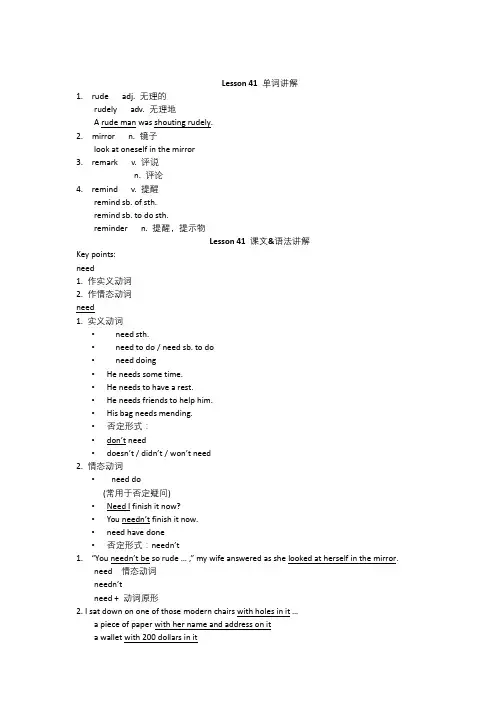
Lesson 41 单词讲解1. rude adj. 无理的rudely adv. 无理地A rude man was shouting rudely.2. mirror n. 镜子look at oneself in the mirror3. remark v. 评说n. 评论4. remind v. 提醒remind sb. of sth.remind sb. to do sth.reminder n. 提醒,提示物Lesson 41 课文&语法讲解Key points:need1. 作实义动词2. 作情态动词need1. 实义动词•need sth.•need to do / need sb. to do•need doing•He needs some time.•He needs to have a rest.•He needs friends to help him.•His bag needs mending.•否定形式:•don’t need•doesn’t / didn’t / won’t need2. 情态动词•need do(常用于否定疑问)•Need I finish it now?•You needn’t finish it now.•need have done•否定形式:needn’t1. “You needn’t be so rude …,” my wife answered as she looked at herself in the mirror.need 情态动词needn’tneed + 动词原形2. I sat down on one of those modern chairs with holes in it …a piece of paper with her name and address on ita wallet with 200 dollars in ita bus with 50 people on it3. We had been in the … shop for half an hour and my wife was still in front of the mirror.She is sitting in the front of the bus.4. “We mustn’t buy things we don’t need,” I remarked suddenly.mustn’t情态动词“禁止,不允许”things we don’t need 定语从句4. “We mustn’t buy things we don’t need,” I remarked suddenly.things we don’t need 定语从句need 实义动词don’t need need +things5. I regretted saying it almost at once.regret regretted regrettedregret sth.regret doing sth.6. “You needn’t have said that,” my wife answered.need have done本来需要做某事,但事实上没做(虚拟)needn’t have done本来不需要做某事,但事实上做了7. “I needn’t remind you of that … tie you bought yesterday.”remind sb. of sth.that … tie you bought yesterday定语从句6. “You needn’t have said that,” my wife answered.needn’t have done 本来不需要做某事,但事实上做了(虚拟)7. “I needn’t remind you of that … tie you bought yesterday.”needn’t do 不需要做,就真的不做(真实)7. “A man can never have too many ties.”“… a woman can’t have too many hats,”…8. My wife was wearing a hat that looked like a lighthouse.定语从句look likeShe looks like her father.Lesson 41 知识拓展高考的考点:情态动词needn’tI ______ use a clock to wake me up because at six o’clock each morning the train comes by my house.A. couldn’tB. mustn’tC. shouldn’tD. needn’t( 课标全国30)I ______ use a clock to wake me up because at six o’clock each morning the train comes by my house.A. couldn’tB. mustn’tC. shouldn’tD. needn’t( 课标全国30)It’s quite warm here; we ______ turn the heating on yet.A. couldn’tB. mustn’tC. needn’tD. w ouldn’t( 天津8)It’s quite warm here; we ______ turn the heating on yet.A. couldn’tB. mustn’tC. needn’tD. wouldn’t( 天津8)I ______ worry about my weekend – I always have my plans ready before it comes.A. can’tB. mustn’tC. daren’tD. needn’t( 上海28)I ______ worry about my weekend – I always have my plans ready before it comes.A. can’tB. mustn’tC. daren’tD. needn’t( 上海28)-What sort of house do you want to have? Something big?-Well, it ______ be big –that’s not important.A. mustn’tB. needn’tC. can’tD. won’t( 陕西9)-What sort of house do you want to have? Something big?-Well, it ______ be big –that’s not important.A. mustn’tB. needn’tC. can’tD. won’t( 陕西9)。
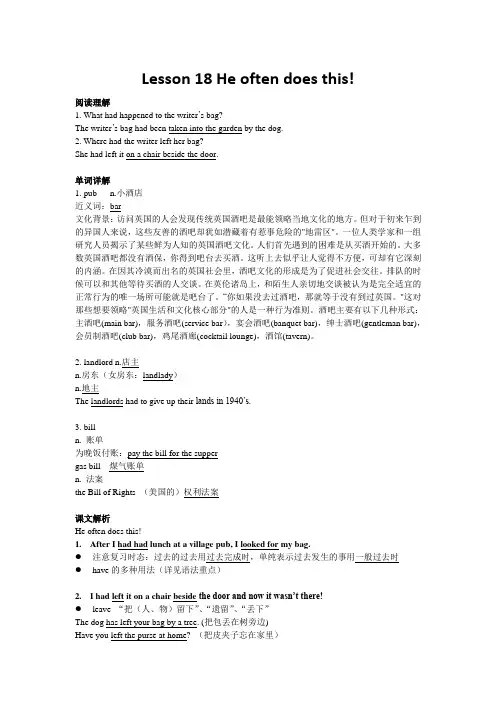
Lesson 18 He often does this!阅读理解1. What had happened to the writer’s bag?The writer’s bag had been taken into the garden by the dog.2. Where had the writer left her bag?She had left it on a chair beside the door.单词详解1. pub n.小酒店近义词:bar文化背景:访问英国的人会发现传统英国酒吧是最能领略当地文化的地方。
但对于初来乍到的异国人来说,这些友善的酒吧却犹如潜藏着有惹事危险的"地雷区"。
一位人类学家和一组研究人员揭示了某些鲜为人知的英国酒吧文化。
人们首先遇到的困难是从买酒开始的。
大多数英国酒吧都没有酒保,你得到吧台去买酒。
这听上去似乎让人觉得不方便,可却有它深刻的内涵。
在因其冷漠而出名的英国社会里,酒吧文化的形成是为了促进社会交往。
排队的时候可以和其他等待买酒的人交谈。
在英伦诸岛上,和陌生人亲切地交谈被认为是完全适宜的正常行为的唯一场所可能就是吧台了。
“你如果没去过酒吧,那就等于没有到过英国。
"这对那些想要领略"英国生活和文化核心部分"的人是一种行为准则。
酒吧主要有以下几种形式:主酒吧(main bar),服务酒吧(service bar),宴会酒吧(banquet bar),绅士酒吧(gentleman bar),会员制酒吧(club bar),鸡尾酒廊(cocktail lounge),酒馆(tavern)。
2. landlord n.店主n.房东(女房东:landlady)n.地主The landlords had to give up their lands in 1940’s.3. billn. 账单为晚饭付账:pay the bill for the suppergas bill 煤气账单n. 法案the Bill of Rights (美国的)权利法案课文解析He often does this!1.After I had had lunch at a village pub, I looked for my bag.●注意复习时态:过去的过去用过去完成时,单纯表示过去发生的事用一般过去时●have的多种用法(详见语法重点)2.I had left it on a chair beside the door and now it wasn’t there!●leave “把(人、物)留下”、“遗留”、“丢下”The dog has left your bag by a tree. (把包丢在树旁边)Have you left the purse at home? (把皮夹子忘在家里)●比较beside与besides①beside prep. 在……旁边,在……附近②besides prep. 除……之外(还)③besides adv. 而且,并且,此外选词填空并翻译句子:I’m quite busy today. Besides, I’ve got a bad cold.我今天很忙,而且我还重感冒了。
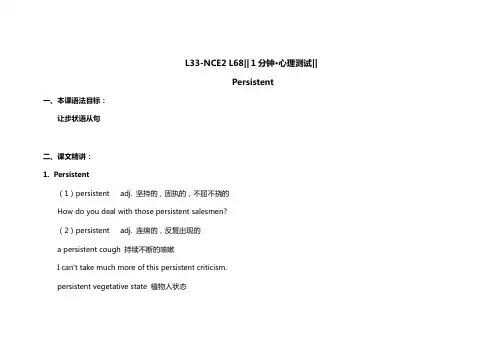
L33-NCE2 L68||1分钟·心理测试||Persistent一、本课语法目标:让步状语从句二、课文精讲:1.Persistent(1)persistent adj. 坚持的,固执的,不屈不挠的How do you deal with those persistent salesmen?(2)persistent adj. 连绵的,反复出现的a persistent cough 持续不断的咳嗽I can't take much more of this persistent criticism.persistent vegetative state 植物人状态(3)persist v. 坚持,维持persist in sth. / in doing sth. 坚持做……你为何对已经发生的事情这样没玩没了地自责呢?Why do you persist in blaming yourself for what happened?If the symptoms persist, consult your doctor.如果症状不消除,你就应该看医生了。
(4)persistence n. 坚持,持续(不可数)我的坚持不懈终于得到了回报。
My persistence was finally rewarded.持续事业的状态the persistence of unemployment2.I crossed the street to avoid meeting him, but he saw me and came running towards me.(1)avoid v. 避免,避开avoid sth. / doing sth.他们在半决赛中勉强躲过一劫。
They narrowly avoided defeat in the semi-final.你应该避免提及她的伤心事。
You should avoid mentioning her sore spot.(2)avoidable adj. 可以避免的许多心脏病造成的死亡都是可以避免的。
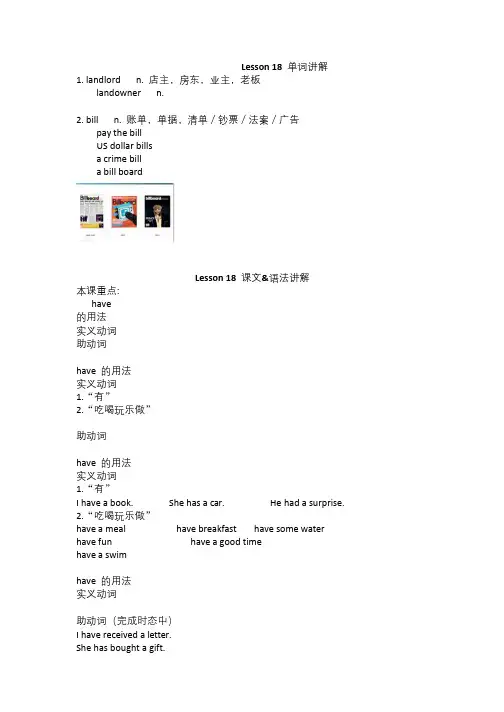
Lesson18单词讲解ndlord n.店主,房东,业主,老板landowner n.2.bill n.账单,单据,清单/钞票/法案/广告pay the billUS dollar billsa crime billa bill boardLesson18课文&语法讲解本课重点:have的用法实义动词助动词have的用法实义动词1.“有”2.“吃喝玩乐做”助动词have的用法实义动词1.“有”I have a book.She has a car.He had a surprise.2.“吃喝玩乐做”have a meal have breakfast have some water have fun have a good timehave a swimhave的用法实义动词助动词(完成时态中)I have received a letter.She has bought a gift.He had left.have的用法(用法不同,变否定疑问也不同)实义动词助动词(完成时态中)I have received a letter.I have not received a letter.She has bought a gift.She has not bought a gift.He had left.He had not left.have的用法(用法不同,变否定疑问也不同)实义动词I have a book.I do not have a book. She has lunch.She does not have lunch. He had a good time.He did not have a good time.助动词(完成时态中)have的用法(用法不同,变否定疑问也不同)实义动词I have a book.I do not have a book. She has lunch.She does not have lunch. He had a good time.He did not have a good time.助动词(完成时态中)I have received a letter.I have not received a letter.She has bought a gift.She has not bought a gift.He had left.He had not left.have的用法练习:(判断用法,并变否定疑问)1.You have a lot of money.2.They had a swim yesterday.3.She has eaten breakfast.4.My dog had taken it into the garden.have的用法练习:(判断用法,并变否定疑问)1.You have a lot of money.2.They had a swim yesterday.3.She has eaten breakfast.4.My dog had taken it into the garden.have的用法练习:(判断用法,并变否定疑问)1.You have a lot of money.You do not have a lot of money.2.They had a swim yesterday.They did not have a swim yesterday.3.She has eaten breakfast.She has not eaten breakfast.4.My dog had taken it into the garden.My dog had not taken it into the garden.have的用法补充两点:“有”have=have got实义动词助动词You have a lot of money.=You have got a lot of money.do not have have not got have的用法补充两点:1.“有”have=have got2.have/has had had hadI had had lunch at a village.We have had trouble with the plan.It has had no effect.1.After I had had lunch…,I looked for my bag.have的过去完成时一般过去时先后2.I had left it on a chair beside the door and now it wasn’t there!beside the doorBesides this book,I have some others.3.As I was looking for it,the landlord came in.4.“Did you have a good meal?”he asked.5.“but I can’t pay the bill.I haven’t got my bag.”6.My dog had taken it into the garden.本课重点:have的用法实义动词助动词Lesson18知识拓展本课重点:if真实条件句(假设将来)Lesson18知识拓展本课重点:have的用法实义动词助动词have的用法实义动词“有”“吃喝玩乐做”助动词(完成时态中)have的用法He had a smoke after dinner.My friend Bill has had a headache.have的用法Their guest room has two big windows.We had had a long vacation after that.本课重点:have的用法实义动词助动词。
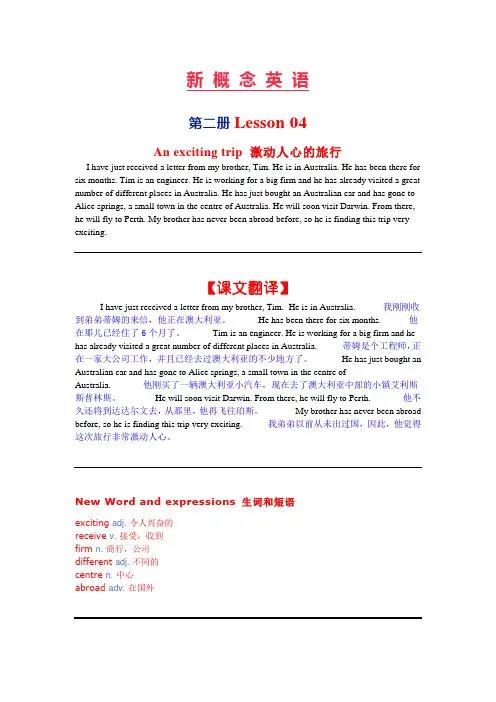
新概念英语第二册Lesson 04An exciting trip 激动人心的旅行I have just received a letter from my brother, Tim. He is in Australia. He has been there for six months. Tim is an engineer. He is working for a big firm and he has already visited a great number of different places in Australia. He has just bought an Australian car and has gone to Alice springs, a small town in the centre of Australia. He will soon visit Darwin. From there, he will fly to Perth. My brother has never been abroad before, so he is finding this trip very【课文翻译】I have just received a letter from my brother, Tim. He is in Australia. 我刚刚收到弟弟蒂姆的来信,他正在澳大利亚。
He has been there for six months. 他在那儿已经住了6个月了。
Tim is an engineer. He is working for a big firm and he has already visited a great number of different places in Australia. 蒂姆是个工程师,正在一家大公司工作,并且已经去过澳大利亚的不少地方了。
Lesson42单词讲解1.musical adj.精通音乐的,音乐的,悦耳的musical instrument乐器2.tune n.曲调play a tune3.glimpse n.一瞥(a quick look)have/get/catch+a glimpse of…We had a glimpse of the snake.4.difference n.差别tell the difference between…and…Lesson42课文&语法讲解本课重点:复习have的用法实义动词助动词have a+n.=对应的v.have的用法实义动词1.“有”2.“吃喝玩乐做”助动词(无实义,用于完成时态中)have的用法实义动词“做”n.v.have a walk=walkWe have a walk.=We walk.We had a walk yesterday.=We walked yesterday.have的用法实义动词“做”n.v.have a walk=walkhave a rest resthave a look lookhave a swim swimhave a sleep sleephave a+n.=对应的v.have的用法练习:(替换划线动词,用have a)1.I wanted to smoke.=have a smoke2.They swam in the sea this morning.=had a swim3.She is resting.=is having a rest4.He was looking at you.=was having a look1.As we had had a long walk…,we stopped at a square to have a rest.had had是have的过去完成时have a walk=walkhave a rest=resthave a+n.=对应的v.2.After a time,we noticed a snake charmer…,so we went to have a look at him.have a look=lookhave a look at…=look at…3.As soon as he saw us,he picked up a long pipe...and opened one of the baskets.I will pick you up on my way home.He picked up some Japanese when he worked there.4.When he began to play a tune,we had our first glimpse of the snake.5.It rose out of the basket…rise rose risenrise vi.The sun rises every day.raise vt.You raise me up.6.…when the snake charmer suddenly began to play jazz and modern pop songs. The snake,however,continued to“dance”slowly.7.The snake,however,continued to“dance”slowly.However,The snake continued to“dance”slowly.The snake continued to“dance”slowly,however. have的用法实义动词1.“有”2.“吃喝玩乐做”have a+n.=对应的v.助动词(无实义,用于完成时态中)Lesson42知识拓展本课重点:have的用法实义动词“有” “吃喝玩乐做”have a+n.=对应的v. 助动词(无实义,用于完成时态中)have a+n.=对应的v.Those two people fought in the bar last night.Those two people had a fight in the bar last night.have a+n.=对应的v.I was looking at the photographs.I was having a look at the photographs.have a+n.=对应的v.Yesterday I rode on a horse for the first time in my life. Yesterday I took a ride on a horse for the first time in my life. have的用法实义动词“有”“吃喝玩乐做”have a+n.=对应的v. 助动词(无实义,用于完成时态中)。
Lesson 33 单词讲解1. darkness n. 黑暗dark adj.-nesshappinessnervousnesscarelessness2. explain v. 解释,叙述explanation n.3. storm n. 暴风雨rain stormsnow stormsand stormbrain storm4. towards prep. 向,朝;接近towards eveningwalk towards the doorThe ball flew towards me.5. ahead adv. 在前面go aheadLesson 33 课文&语法讲解Key points: 表示地点的介词(prep.)Review:L9 介词(prep.)1. Nearly a week passed before the girl … explain what had happened to her.pass v. A week passed.past prep. It is eleven past ten.n. We cannot change the past.adj. The past experiences brought me here.2. … she set out from the coast in a small boat and was caught in a storm.set out / offbe caught in …I was caught in the traffic jam yesterday.3. Towards evening, the boat struck … and the girljumped into the sea.4. Then she swam to the shore after spending the … nightin the water.strike struck struck swim swam swum5. She knew she was near … because the light was high up on the cliff.know knew known6. On arriving at the shore, the girl struggled … towards the light …7. … the girl struggled up the cliff towards the light she had seen.the light (that/which) she had seen8. That was all she remembered.all (that) she remembered表示地点的介词(prep.) setout from the coast swam tothe shore towards the light shehad seen jumped into the seaout of darkness表示地点的介词(prep.)arriving at the shoreon the cliffin a small boat / in a storm / in hospital表示地点的介词(prep.)•Don’t throw the rubbish ______ the window.•Please come ______ the classroom and join us.•He is in Shanghai, and he will fly ______ Shanghai ______ Beijing.•She hopes that she will stand ______ the top of the highest mountain some day.•It is impolite to point ______ people.•I put the laptop ______ your bag.Lesson 33 知识拓展高考新题型单词拼写He tried to ________ (解释), but she wouldn’t listen.explain v. explanation n. ( 陕西) set out todo sth. set off to do sth.set about doing sth.set up + n.set down + n.We ______ to paint the whole house but finished only the front part that day.A. set aboutB. set upC. set outD. set down( 全国12)We ______ to paint the whole house but finished only the front part that day.A. set aboutB. set upC. set outD. set down( 全国12)Armed with the information you have gathered, you can ______ preparing your business plan.A. set outB. set aboutC. set offD. set up( 浙江15)Armed with the information you have gathered, you can ______ preparing your business plan.A. set outB. set aboutC. set offD. set up( 浙江15)-I probably shouldn’t have any more cake.-Oh, ______. It won’t kill you.A. go aheadB. hold on, pleaseC. you’re welcomeD. that’ll do( 辽宁35)-I probably shouldn’t have any more cake.-Oh, ______. It won’t kill you.A. go aheadB. hold on, pleaseC. you’re welcomeD. that’ll do( 辽宁35)阅读理解介词•Some of the best housing ________ London is never advertised but is passed on from one group of students to another by word of mouth.•( 浙江阅读B)阅读理解介词•Neither philosopher lived ________ times of peace, though there were more wars ________ Greece than ________ China.•( 江西阅读C)阅读理解介词•Andy rode slowly ________ his way to school, day-dreaming about the fishing trip that his father had promised him.•( 江西阅读A)阅读理解介词•________ the road to the harbour we could see the terrible destruction ________ the coast, but the harbour itself was in fairly good shape.•( 湖北阅读A)阅读理解介词•Joyce stayed ________ home, cooking and cleaning like a typical housewife of the time, though everything took three times as long.•( 陕西阅读C)。
Lesson 89 单词讲解1. slip n. 小错误滑倒a slip of the tongue 口误2. comedy n. 喜剧tragedy n. 悲剧3. present n. 礼物;现在v. 演出赠送adj. 出席,到场的现在的4. queue v. 排队Please queue here.n. 队伍,长队wait in the queuejump the queue5. dull adj. 枯燥,无味dull booksboring adj. 无趣的,乏味的6. advertiser n. 报幕员登广告的人,广告商advertise v. 做广告,宣传advertisement n. 广告advertisement company 广告公司commercial advertisement 商业广告classified advertisement 分类广告Lesson 89 课文&语法讲解1. People will do anything to see a free show – even if it is a bad one.2. When the news got round that a comedy show would be presented at our local cinema by …,we all rushed to see it.3. When the news got round that a comedy show would be presented at our local cinema …,we all rushed to see it. 分裂结构的同位语从句原本的写法:When the news that a comedy show would be presented at our local cinema … got round , we all rushed to see it.4. We had to queue for hours to get in and there must have been several hundred peoplepresent …had to do sth.for hoursto get inthere bemust have donethere must have been …5. Those who failed to get in need not have felt disappointed, as many of the artistes whoshould have appeared did not come.情态动词的虚拟:should have done 本来应该做某事,但是没做need not have done 本来不需要做某事,但是做了5. Those who failed to get in need not have felt disappointed, as many of the artistes whoshould have appeared did not come.5 Those who failed to get in need not have felt disappointed, as many of the artistes whoshould have appeared did not come.5. The only funny things we heard that evening came from the advertiser …The only funny things we heard that evening came主主谓谓从句6. We all know what the poor man should have said …should have said情态动词的虚拟“本来应该做某事,但实际没有做”know what the poor man should have said宾语从句7. …but what he actually said was: “This is the …company. Good ladies, evening andgentlemen!”what he actually said主语从句位于句首Lesson 89 知识拓展分裂结构:When the news got round that a comedy show would be presented at our local cinema …, ...原本的写法:When the news that a comedy show would be presented at our local cinema … got round , …分裂结构两种形式:•后移•插入分裂结构两种形式:•后移When the news got round that a comedy show would be presented at our local cinema …, …•When reports came into London Zoo that a wild puma had been spotted forty-five miles south of London, they were not taken seriously.•Concerns were raised that witness might be encouraged to exaggerate their stories in court to ensure guilty verdicts.•When reports came into London Zoo that a wild puma had been spotted forty-five miles south of London, they were not taken seriously.•Concerns were raised that witness might be encouraged to exaggerate their stories in court to ensure guilty verdicts.分裂结构两种形式:•插入•… This, however, i s not the best solution.•Dogs, it seems, love to chew up money!•They have all been put to shame by a boy who, while playing truant, travelled 1,600 miles.•We learn from history that we don’t learn from history.•Dogs, it seems, l ove to chew up money!•They have all been put to shame by a boy who, while playing truant, t ravelled 1,600 miles.•We learn from history that we don’t learn from history.。
Lesson60单词讲解1.future n.未来,前途in the(near/distant)futurelook forward to the future2.fair n.集市,展览会adj.公平的3.impatiently adv.不耐烦地patient adj.有耐心的n.患者,病人patiently adv.耐心地impatient adj.没有耐心的,不耐烦的Lesson60课文&语法讲解本课重点:复习表示将来的各种方式1.At a village fair,I decided to visit a fortune-teller called Madam Bellinsky.a school busa birthday presenta door keya crystal ball2.After I had given her some money,she looked into a crystal ball and said:过去完成时vs.一般过去时3.'A relation of yours is coming to see you.4.She will be arriving this evening and intends to stay for a few days.表示将来的方式:一般将来时will do am/is/are going to do现在进行时am/is/are doing 将来进行时will be doing5.The moment you leave this tent,you will get a big surprise.时间状语从句一般现在时表示将来时表示将来的方式:一般将来时will do am/is/are going to do现在进行时am/is/are doing将来进行时will be doing一般现在时do/does(时间或条件状语从句中)表示将来的方式:一般现在时do/does(时间或条件状语从句中)改错The boss will review your work after she will return from vacation next week.I’ll give you a call on my cell phone as soon as my plane will land.表示将来的方式:一般现在时do/does(时间或条件状语从句中)改错The boss will review your work after she will return from vacation next week.I’ll give you a call on my cell phone as soon as my plane will land.表示将来的方式:一般现在时do/does(时间或条件状语从句中)改错The boss will review your work after she will return from vacation next week.I’ll give you a call on my cell phone as soon as my plane will land.表示将来的方式:一般现在时do/does(时间或条件状语从句中)改错I don’t like my current job,but I’m going to stay with this company until I will find something better.表示将来的方式:一般现在时do/does(时间或条件状语从句中)改错I don’t like my current job,but I’m going to stay with this company until I will find something better.表示将来的方式:一般现在时do/does(时间或条件状语从句中)改错If it will be cold tomorrow,we will go to a movie.If it won’t be cold tomorrow,we’ll go to the beach.表示将来的方式:一般现在时do/does(时间或条件状语从句中)改错If it will be cold tomorrow,we will go to a movie.If it won’t be cold tomorrow,we’ll go to the beach.表示将来的方式:一般现在时do/does(时间或条件状语从句中)改错If it will be cold tomorrow,we will go to a movie.If it won’t be cold tomorrow,we’ll go to the beach.6.As soon as I went outside,I forgot all about Madam…because my wife hurried towards me.7.'Where have you been hiding?'...8.'Your sister will be here in less than an hour and we must be at the station to meet her...'本课重点:复习表示将来的各种方式一般将来时will do am/is/are going to do现在进行时am/is/are doing 将来进行时will be doing一般现在时do/does(时间或条件状语从句中)Lesson60知识拓展本课重点:复习表示将来的各种方式本课重点:复习表示将来的各种方式•一般将来时will do am/is/are going to do•现在进行时am/is/are doing•将来进行时will be doing•一般现在时do/does(时间或条件状语从句中)•A lifeboat_____(set)out tomorrow to search for the shipwreck.•The crew_____(send)radio messages to the wreck until they_____(receive)a signal from the men on board.•As soon as they_____(receive)a signal,they_____(try)and find the wreck with powerful searchlights.•The moment the crew_____(locate)the wreck,they_____(fire)a special gun which_____(carry)a rope from the life boat to the sinking ship.•If the sea is rough,they____(pour)oil on the water.•They are sure to succeed,but if they fail,a helicopter_____(send)out the next day.•Helicopters are very useful for rescue work,but they cannot be used at night.。
Lesson 71 单词讲解1. parliament n. 议会,国会the Houses of Parliament2. official n. 官员,行政人员officer n. 军官,高级官员,高级职员3. observatory n. 天文台observe v. 观察,研究4. check v. 检查,核对May I check / see your passport?n. 检查,支票double check bank check5. microphone n. 扩音器,麦克风micro- 微型的MicroSoft 微软microwave oven 微波炉microscope 显微镜Lesson 71 课文&语法讲解1. When you visit London, one of the first things you will see is Big Ben, the famous clock whichcan be heard all over the world on the B.B.C.复习分析句子one of the first things you will see is Big Ben,主主谓谓从句2. If the Houses of Parliament had not been burned down in 1834, the great clock would never have been erected.虚拟条件句假设过去L643. Big Ben takes its name from Sir Benjamin … who was responsible for the making of the clock when the new Houses of Parliament were being built.who 定语从句when 时间状语从句were being built 过去进行时的被动语态4. It is not only of immense size, but is extremely accurateas well.并列句L255. Officials from Greenwich Observatory have the clockchecked twice a day.have sth. done L586. On the B.B.C. you can hear the clock when it is actually striking because microphones are connected to the clock tower.7. Once, however, i t failed to give the correct time.8. A painter who had been working on the tower hung a pot of paint on one of the hands and slowed it down!A painter who had been working on the tower hung a pot of paint on one of the hands and slowed it down!A painter who had been working on the tower hung a pot of paint on one of the hands and slowed it down!who 定语从句L28had been doing 过去完成进行时L62and 并列句L25Lesson 71 知识拓展复习:语言——语法——连词成句1~3 单元主要内容以句子为线索复习方法:•第4 单元的复习重点内容的归纳总结•把握24 课的循环规律例如:第1-25-49-73 课,第3-27-51-75 课…复习的内容:•背单词•熟读课文•复习笔记•做针对性的真题•少量多次,循环反复!。
Lesson64单词讲解1.port n.港口airport n.空港,飞机场2.ventilate v.通风well-ventilated adj.通风良好的ventilation n.通风3.invasion n.入侵,侵略This is the invasion of my privacy.invade v.入侵,侵略,侵袭Hitler invaded Poland in September,1939.4.officially adv.正式地,官方地Officially,the election campaign will begin in July.The gallery was officially open last month.5.connect v.连接connect…to/with…The bridge connected this small town to the big big city.connection n.6.European adj.欧洲的,欧洲人的n.欧洲人European continent欧洲大陆European Union欧盟Europe n.欧洲euro n.欧元Lesson64课文&语法讲解本课重点:if非真实条件句(虚拟)--假设过去宾语从句的虚拟1.In1858,a French engineer…arrived in England with a plan for a twenty-one-mile tunnel under the English Channel.简单句同位语with a plan for a…tunnel…2.He said that it would be possible to build a platform in the centre of the Channel.that引出宾语从句to do真正的主语it形式主语3.The tunnel would be well-ventilated if tall chimneys were built above sea level.4.In1860,a better plan was put forward by an Englishman...put forward提前,提出put forward a plan/proposalput forward some new ideas5.He suggested that a double railway-tunnel should be built.suggest表示“建议”,其后宾语从句要虚拟从句中谓语动词=(should)+动词原形表示“建议/命令/要求”,其后宾语从句都要虚拟:suggest,advise,propose,recommend/order/ask,demand,insist,request…The engineers proposed that they_____(look)at the design again.The professor recommended we_____(look)for the information in the library.表示“建议/命令/要求”,其后宾语从句都要虚拟:suggest,advise,propose,recommend/order/ask,demand,insist,request…The teacher always suggests the students_____(go)over the text before the test. The workers demanded they_____(give)the wages they should get.6.This would solve the problem of ventilation,for if a train entered this tunnel,it would draw in fresh air behind it.6.This would solve the problem of ventilation,for if a train entered this tunnel,it would draw in fresh air behind it.7.如果不是因为那时英国人害怕入侵,隧道早已建成了。
A private conversation私人谈话【NEW WORDS AND EXPRESSIONS】生词和短语★private adj.私人的it's my private letter/house ;private school:私立学校public:公众的,公开的public school ; public letter 公开信;public place :公共场所privacy:隐私 it's a privacy. adj.《Private Ryan》 private soldier:大兵private citizen 普通公民 private life:私生活★conversation n.谈话subject of conversation:话题talk.可以正式,也可以私人的conversation. 比较正式一些let's have a talkThey are having a conversation.conversation 用的时候比talk正式,意思上往往不非常正式.talk:可正式可不正式dialogue:对话China and Korea are having a dialogue. 正式chat: 闲聊gossip:嚼舌头have a + talk/chat/dialogue/conversation/gossip 名词变动词★theatre n.剧场,戏剧cinema: 电影院★seat n.座位have a good seat(place)take a seat : 座下来,就座take your seat/take a seatIs the seat taken? 这个座位有人吗?no/yessit sit down ,pleaseseat take your seat,pleasebe seated,please 更为礼貌seat是及物动词,后面有宾语sit是不及物动词,后面不加宾语seat后面会加人; seat sb; seat him; seat:让某人就座sit he is sitting there.you seat him;〖语法精粹〗4.When all those present(到场者)_D_ he began his lecture.(重点题)A.sitB.setC.seatedD.were seaedsit,sit down; seat,be seated;take a seat★play n.戏★loudly adv. 大声的★angry adj. 生气的cross=angry ; I was angry.He was cross.annoyed: 恼火的;I was annoyed.I was angry/cross.I was very angry.be blue in the face; I am blue in the face.★angrily adv. 生气的副词修饰动词★attention n. 注意Attention ,please. 请注意pay attention :注意pay attention to : 对什么注意You must pay attention to that gril.pay a little attention :稍加注意pay much attention :多加注意pay more attention :更多注意pay no attention :不用注意★bear(bore,borne) v. 容忍bear,standI can't bear/stand youendure :忍受,容忍put up with :忍受I got divorced.I could not put up with himbear/stand/endure忍受的极限在加大put up with=bear=standbear n.熊 white bearbear hog :热情(热烈)的拥抱give sb a bear hug★business n. 事business man :生意人do business: 做生意go to some place on business:因公出差I went to Tianjin on business.thing 可以指事情,也可以指东西It's my business 私人事情it's none of your business★rudely adv. 无礼地,粗鲁地rude adj.【TEXT】Last week I went to the theatre. I had a very good seat. The play was very interesting. I did not enjoy it. A young man anda young woman were sitting behind me. They were talking loudly. I got very angry. I could not hear the actors. I turned round. I looked at the manand the woman angrily. They did not pay any attention. In the end, I could not bear it. I turnedround again. "I can't hear a word!" I said angrily."It's none of your business," the young man said rudely. "This is a private conversation!"参考译文上星期我去看戏。
我的座位很好,戏很有意思,但我却无法欣赏。
一青年男子与一青年女子坐在我的身后,大声地说着话。
我非常生气,因为我听不见演员在说什么。
我回过头去怒视着那一男一女,他们却毫不理会。
最后,我忍不住了,又一次回过头去,生气地说:“我一个字也听不见了!”“不关你的事,”那男的毫不客气地说,“这是私人间的谈话!”【课文讲解】Last weekgo to the theatresee a film,go to the cinemago to the +地点表示去某地干嘛go to the doctor's 去看病go to the dairy 去牛奶店go to the + 人 + 's 表示去这个人开的店go to the butcher's 买肉go to school: 去上学go to church: 去做礼拜go to hospital(医院):去看病go to the Great Wallgo home; 跟home相连一定表示没有事情可做,回家休息I am at homeenjoy, enjoy oneself:玩的开心enjoy+sth :喜欢,从当中得到一种享受I like something very much./I love something.I enjoy the class.I enjoy the music.I enjoy the book.enjoy the dinner/film/progeam/gamewere sitting :当时正座在过去进行时态 :过去的某个时间正在发生的动作一个故事的背景往往用进行时态描述I+be+v(ing)The girl was reading a book in the garden.A boy came to her.got :变得,表示一种变化,got angryI am/was angry 是一个事实I got angry:强调变化过程It is hot.It got hot.got取代be动词,got是一个半联系动词,可以直接加形容词说话的时候喜欢用缩略.I'm not,he isn't,they aren't写的时候会说:I am not,he is not,they are notI didn't do sth,I did not do sthhear:听见hear+人:听见某人的话I could not hear you.Beg your pardon?I couldn't hear you./I couldn't hear a word./I couldn't catch your word.I couldn't hear you clearly./I couldn't catch your words.Beg your pardon? /I couldn't catch your words.turn round:转头pay any attention表示注意,pay attention; 对什么加以注意,pay attention to sthnot any=noI could not bear it./you./the noise.I can't hear a word.美音:肯定 .I can,否定,I can't,只能根据上下文来定hear a word, a word 等于一句话He didn't say a word.May I speak to Jim?/May I have a word with Jim?It's none of your business./None of your business/It's my business.I couldn't bear you.This is private conversation!private :私人的,不想与别人共享I can't hear a word.hear a word of sb (actors)Key stuctures : 关键句型Summary writing : 摘要写作answer this questions in not more than 55 words.写作当中的第一步从完整句子开始写起【KEY STUCTURES】关键句型Word order in simple statements: 简单陈述句的语序陈述句一定是有主语,有动词,有宾语,有句号看教材第2页6 1 2 3 4 5 6when? Who? Action Who? How? Where? When?Which? Which?What? What?Last week1 ---主语一般有名词或代词构成2 ---谓语由动词充当3 ---宾语4 ---副词或介词短语,对方式或状态提问,往往做状语 I like her very much5 ---地点状语6 ---时间状语可以放在句首或句末 I like the girl very much in Beijing lastyear.简单陈述句一定不能少的是主语6. Immediately left he.He left immediately.13. The little boy; an apple; this morning; ate greedily; in the Kitchen. The little boy ate an apple greedily in the Kitchen this morning.4 Game; played; yesterday; in their room; the children; quietlyThe children played games quietly in their room yesterday.主语——>动词——>宾语——>状语状语: 放在最前面是副词,方式状语,表示状态/程度的状语,下面是地点,然后是时间1.主语和动词不能少2.如果时间和地点连在一起,先放地点,再放时间如果问何时何地,是一个固定搭配 when and where【Multiple choice questions】多项选择题Comprehension 理解Strucures 句型Vocabulary 词汇(1)...b..."They did not pay any attention"pay attention: 注意(在思想上)notice: 注意(=see 眼睛看)(4)...sitting behindbehind: 在...后面in front of :在...前面 (相对静止的概念)before : 在...前面 (+词、句子、一定和时间相连)above: 在...上面ahead of: 在...前面 (+时间、位置)(动态的行为)He arrived before six o'clock.Before he came backAhead of timeHe goes ahead of me.(5) ...c...how ——对一个方式、状态提问特殊疑问词对后面的答案提问angry(adj)how(adv.)——对形容词、副词、介词短语提问where ——用介词,地点when ——用介词,时间why ——用because回答(7) ...d...any——用在否定句和疑问句中some——用在肯定句中none——没有任何东西、没有任何人 None knows./None of us knows.not any=nonot——否定词,要放在非实义动词后面He didn't pay attentionno——形容词、修饰名词I don't have any friends./I have no friends.I have no time./I don't have any time.(11)...suffer:遭受,忍受 (精神或肉体上)+痛苦bear: 忍受=standI suffer the headache.He often suffers defeat.Lesson 2Breakfast or lunch?早餐还是午餐?First listen and then answer the question.听录音,然后回答以下问题。